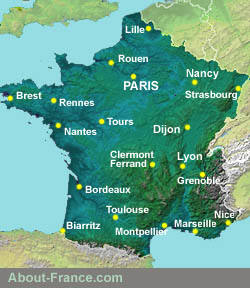- Explore France ►
- Essential pages
- Travel in France
- Where to go
- What to see and do
About-France.com
- the connoisseur's guide to France
Interrogatives - How to ask questions in French
1. Questions without any question word
The forming of questions in French is fundamentally similar to the way
we
form questions in English. The basic principal is that the verb
is placed before the subject, i.e. there is a subject
/ verb inversion.In written French, questions are usually formed by inverting subject and verb; but how this is done depends on the type of verb (with or without an auxiliary) and on whether the subject is a pronoun or a noun.
Note: in cases of
inversion where
the
pronouns il(s) elle(s) or on follow a verb form ending in a vowel,
French adds a linking -t-
between the verb and the pronoun; for example va-t-il,
not va-il, or pense-t-elle,
not pense-elle.
Particularly in spoken French, any question (all the types
below) can alteratively be
expressed by adding "Est-ce que"
to the front of a statement. See Part
3 below.► For questions with
question words ( such as qui, quand,
où ),
continue to Interrogative
pronouns adverbs & adjectives
1.1. Verbs with no auxiliary (single word verbs)
1.1.1. When the subject is a pronoun - with the verb être
In the simplest statements, and when the subject is a pronoun, English and French questions are formed in just the same way, as in this example :| Statement | Question | |
| Structure |
subj > verb > complement |
verb > subj. > complement |
| English | She is your sister | Is she your sister? |
| French | Elle est votre soeur. | Est-elle votre soeur? |
1.1.2. When the subject is a pronoun - Other verbs
To make a question using any other English verb, we always need to use an auxiliary (as in do you like). Here French is a bit simpler than English, and simple inversion is possible with all verbs when they are used with a pronoun subject and single-element tenses, i.e. tenses that do not require an auxiliary – which means most tenses in French (present, simple past, imperfect, future, etc).| Statement | Question |
| subj > verb > complement |
verb > subj. > complement |
| Il aime votre soeur | Aime-t- il votre soeur ? |
| Ils vivent à Londres. | Vivent-ils à Londres |
| Vous voyez la voiture rouge. | Voyez-vous la voiture rouge? |
| Vous irez à Paris demain. | Irez-vous à Paris demain |
| Il ne vient pas. | Ne vient-il pas? |
| Il ne parlera pas en premier. | Ne parlera-t-il pas en premier ? |
1.1.3. When the subject is a noun - with être and other verbs
Here there are some important differences between English and French.English:
It makes no difference whether the subject is a pronoun or a
noun. The same structure verb to be
> subj. > complement is possible in
English. We can say Is she your sister?, but we can also ask Is Mary your sister? , or Is this girl your sister ?, or even Is this girl I'm showing you a photo of your sister? This is not possible in French.
French:
French uses a different structure if the subject is a noun.
Instead of placing the noun subject between the verb and the
complement, French repeats the subject
- firstly as a noun, then as a
pronoun, on the structure:subject noun > verb to be > subject pronoun > complement
| Statement | Question |
| Subj noun > verb > complement |
Subj. noun > verb > pron. > complement |
| Jacques aime votre soeur | Jacques aime-t- il votre soeur ? |
| Les Dupont vivent à Londres. | Les Dupont vivent-ils à Londres ? |
| Le médecin a une voiture rouge. | Le médecin a-t-il une voiture rouge? |
| Le chat dort dans un panier. | Le chat dort-il dans un panier ? |
| Le chat dormira dans un panier. | Le chat dormira-t-il dans un panier ? |
Cette fille dont je vous montre une photo, est-ce (est-elle) votre soeur?
1.2. Verbs with two elements (auxiliary / verb)
1.2.1. When English and French are alike
When the subject of the sentence is a pronoun, and in contexts where in both French and English the verb tense is formed with the use of an auxiliary (notably in the perfect or passé composé tense, or with modals) English and French questions are formed in just the same way, as in these examples :| Statement | Question | |
| Structure |
Subj > v1 > v2 > object |
V1 > subj.> v2 > complement |
| English | You have eaten an egg | Have you eaten an egg ? |
| French | Vous avez mangé un oeuf. | Avez-vous mangé un oeuf ? |
| English | They have seen the film | Have they seen the film ? |
| French | Ils ont vu le film. | Ont-ils vu le film ? |
| English | You should read this book | Should you read this book ? |
| French | Vous devriez lire ce livre. | Devriez-vous lire ce livre ? |
1.2.2. Cases when English and French are NOT alike
However if there is a direct or indirect pronoun object (IO) in the statement, such as lui or leur in French, this comes before the initial auxiliary – which is not the same as in English| French | English |
| (IO) > v1 > pron. > v2 > object | v1 > subj. > v2 (v3) > (IO) > object. |
| Lui avez-vous donné de l'argent? | Have you given him some money ? |
| Vous a-t-il raconté sa vie? | Did he tell you his life story? |
- a) Unlike English, French does not allow simple inversion when the subject of a sentence is a noun, and
- b) Most tenses in French are formed without an auxiliary, whereas in English we always use an auxiliary (do, did, has, was etc.) to create the interrogative form of a verb.
subject noun > v1 > subject pronoun > v2 > object
In which v1 is an auxiliary or modal, and v2 the main verb (infinitive or past participle)
| Statement | Question |
| Subj noun > v1 > v2 > object |
Subj. noun > v1 > pron. > v2 > object |
| Jacques a vu votre soeur | Jacques a-t- il vu votre soeur ? |
| Les Dupont ont vécu à Londres. | Les Dupont ont-ils vécu à Londres |
| Le médecin a eu une voiture rouge. | Le médecin a-t-il eu une voiture rouge? |
| Le chat veut dormir dans un panier. | Le chat veut-il dormir dans un panier ? |
| Le chat devra dormir dans un panier. | Le chat devra-t-il dormir dans un panier ? |
| French | English |
| Subj. noun > v1 > pron. > v2 > object | v1 > subj. > v2 (v3) > object. |
| Jacques a-t- il vu votre soeur ? | Has Jacques seen your sister ? |
| Les Dupont ont-ils vécu à Londres | Did the Duponts live in London? |
| Le médecin a-t-il eu une voiture rouge? | Does the doctor have a red car? |
| Le chat veut-il dormir dans un panier ? | Does the cat want to sleep in a basket? |
| Le chat devra-t-il dormir dans un panier ? | Will the cat have to sleep in a basket |
A few more examples
Examples:
1. Avez-vous fini de
manger?
Have you finished eating ?2. Voulez-vous danser avec moi ? ?
Would you like to dance with me?.3. Dois-je mettre tous les sacs
dans la
voiture ?
Must I put all the bags in the car?4. Est-il nécessaire
d'aller à Londres ?
Is it necessary to go to London ?5. Savez-vous combien de temps
cela va
prendre?
Do you know how long it will take ?6. Lui avez-vous dit tout ce que
vous
savez ?
Have you told him everything you know?7. Les gendarmes vous ont-ils dit
tout
ce qu'ils savent ?
Have the policemen told you everything they know
know?8. Les gendarmes ont-ils
dit à linspecteur tout ce qu'ils savent ?
Have the policemen told the inspector everything
they know know?
1.3. Questions using Est-ce que....
Fortunately for students, French has another less complicated way of forming questions, which is the same in virtually all cases. It is just to add "Est-ce que" to the front of a statement. With "Est-ce que" in front of it, any statement becomes a question. Here again are the examples above, but this time instead of the English translation you'll find the French alternative using est-ce que.Examples:
1. Avez-vous fini de
manger?
Est-ce que vous avez fini de manger ?2. Voulez-vous danser avec moi
?
Est-ce que vous voulez danser avec moi?.3. Dois-je mettre tous les sacs
dans la
voiture ?
Est-ce que je dois mettre tous les sacs dans la
voiture?4. Est-il nécessaire
d'aller à Londres ?
Est-ce qu'il est nécessaire d'aller
à Londres ?5. Savez-vous combien de temps
cela va
prendre?
Est-ce que vous savez combien de temps cela va
prendre?6. Lui avez-vous dit tout ce que
vous
savez ?
Est-ce que vous lui avez dit tout ce que vous
savez ?7. Les gendarmes vous ont-ils dit
tout
ce qu'ils savent ?
Est-ce que les gendarmes vous ont dit tout ce
qu'ils savent ?8. Les gendarmes ont-ils
dit à linspecteur tout ce qu'ils savent ?
Est-ce que les gendarmes ont dit
à linspecteur tout ce qu'ils savent?
A question of style.
Question-forming with Est-ce que is very common in colloquial spoken French, less common in written French► For questions with
question words ( such as qui, quand,
où ),
continue to Interrogative
pronouns adverbs & adjectives
►Return to French grammar index
►Return to French grammar index
About-France.com
Online French Grammar
: Copyright
© About-France.com 2003 - 2025
Return to About-France home page Full site index Contact
Return to About-France home page Full site index Contact
Essential
French words
and phrases for travellers 25 essential words and
25 vital phrases






